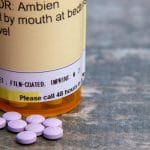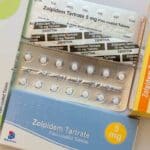Ambien insufflation (snorting) is a form of drug abuse. Because this prescription medication can cause sedative effects, some may turn to this form of Ambien misuse.
Zolpidem (brand name Ambien) is a sedative-hypnotic prescription drug classified as a Schedule IV controlled substance due to its ability to be habit-forming. This medication is also available as extended-release tablets (Ambien CR).
The euphoric side effects from Ambien use are due to the medication targeting the neurotransmitter gamma-aminobutyric acid (GABA) and relaxing the central nervous system (CNS). Because of this, some use snorting as a way to enhance the euphoria and sedation.
Those participating in this type of drug use may crush the Ambien pill into a powder and use a straw or other object to snort the substance. This can lead to a number of serious effects and dangers.
Effects Of Snorting Ambien
Snorting Ambien can lead to a wide-range of side effects which can range in severity.
Nasal Damage
Ambien abuse by insufflation can lead to severe damage to the nasal passageways. Those who snort Ambien may develop a number of serious health concerns.
Nasal issues caused by Ambien insufflation include:
- a damaged or deviated septum
- a chronic runny nose
- frequent nosebleeds
- persistent sinus infections
- bacterial infections at the wound site
In addition to these serious side effects, some of the more common side effects of Ambien use can be heightened when the drug is snorted.
Increased Side Effects
In addition to the symptoms of snorting Ambien, Ambien causes some common side effects when taken regularly. According to the United States Food and Drug Administration (FDA), some of these side effects include drowsiness, dizziness, and feelings of sedation.
Withdrawal Symptoms
Those who take Ambien for long-term use may develop withdrawal symptoms if the sleep aid is abruptly stopped.
Some of the withdrawal symptoms include:
- lightheadedness
- panic attacks
- suicidal thoughts
- tremors
- fluctuations in heart rate
- sweating
- fatigue
- muscle cramps
Dangers Of Snorting Ambien
There are a number of dangers associated with snorting Ambien.
Blackouts & Memory Problems
Some of the rare side effects which may take place when Ambien is abused include having blackouts or severe memory loss. A person snorting drugs such as Ambien may experience hallucinations in addition to the sleepwalking and sleep-driving that may occur.
Activities such as making phone calls, having sex, and making food can be performed without the person being aware. In fact, they may not remember doing any of the activities the next day.
Sleep-driving can result in motor vehicle crashes while sleep walking can cause accidental falls or drownings to occur.
Polydrug Abuse
Combining Ambien with other medications can create serious adverse events. In fact, according to the Substance Abuse and Mental Health Services Administration (SAMHSA), numerous emergency room visits have taken place due to adverse reactions involving Ambien.
Ambien should not be combined with the following:
- alcohol
- benzodiazepines
- opioids
- certain antidepressants
- certain antifungal medications
- vitamins or supplements
- barbiturates
- other sleep aids
Ambien Overdose
A risk of overdose may occur in those who snort Ambien in high doses. Since snorting Ambien can greatly increase the effects of the drug, those who do so have a higher risk of overdose, which can be life-threatening.
Some of the symptoms of an Ambien overdose may include:
- seizures
- respiratory depression
- severe drowsiness
- fluctuations in heart rate
- loss of consciousness
- chest pain
If you suspect an overdose has taken place, contact 911 immediately.
Drug Addiction Treatment
Addiction treatment programs for sedative-hypnotics like Ambien can include medical detox for withdrawal, behavioral therapy, and peer support groups. These treatment options are available on both an inpatient and outpatient basis.
To find out if our outpatient treatment program is right for you or a loved one, please contact Northeast Addictions Treatment Center.
Sources
Written by
Northeast Addition Editorial Team
©2024 Northeast Addition Center | All Rights Reserved
This page does not provide medical advice.





